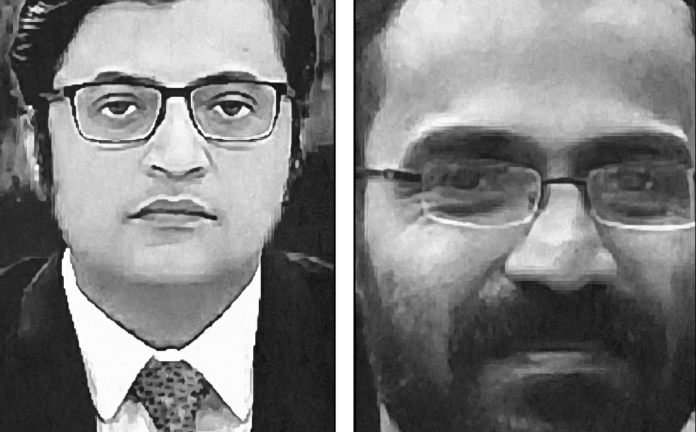 |
| Arnab Goswami || Siddique Kapan |
“A man of courage never needs
weapons, but he may need Bail.”
–
Lewis Mumford, American historian
It
is the sacrosanct obligation of all concerned with the justice dispensation
system to ensure that the administration of criminal justice remains effective
and meaningful. Literally, the expression ‘bail’ denotes a security for
appearance of a prisoner for his release. Bail is a grant of conditional
liberty to an accused who assures or on whose behalf assurance is given that he
would be present at the trial. It is imperative to note that the very idea of
bail emerges from an assumption, of the accusatorial framework, i.e. innocent till proven guilty.
As
recognized by the English jurist, William Blackstone, “it is better that ten guilty
persons escape, than that one innocent suffer.” An incalculable wrong is done to an innocent
person who spends even a single day in prison. From the date of recording of an
FIR till consummation of the trial process and the case decision, the law
contains different arrangements to release an accused on bail. Through multiple
decisions, the Supreme Court of India has held that bail is a privilege and is
significant in a democratic republic, until he is demonstrated liable through a
fair trial process.
A
Mathura court on November 13th’ 2020, dismissed the bail plea of
three persons, booked on charges of sedition and terrorism after their arrest
in Mathura along with a Kerala journalist namely, Siddique Kappan – who was on
his way to Hathras village to meet the family of a Dalit woman who died after being
brutally gang raped.
This
denial of bail must be examined in context with the speed with which Arnab
Goswami received bail, after just a single hearing in the Supreme Court. The
speedy hearing and the grant of bail to Arnab Goswami has rekindled the moot
question regarding the selective treatment of the high and the mighty – “Whether
the privilege to fundamental rights is only a prerogative of the riches”?
When
bail is refused, it is a restriction on personal liberty of the individual
guaranteed by Art.21 of the Constitution and therefore such refusal must be
rare. Where delays in the disposal of criminal proceedings take place, the
accused ought not to be kept in custody for an inordinately long time and must
be released on bail except when under extremely rare circumstances it is not
possible to do so.
Personal
liberty is recognised significantly in the constitutional framework under
Article 21. While considering bail applications of the accused, it is important
that the courts balance considerations of personal liberty and the interests of
the general public, thereby paving a way for judicial discretion in matters of
bail.
It is the solemn duty of the court to decide
the bail applications at the earliest by a reasoned order, based on the bona
fides of the applicant in light of prevailing facts and circumstances. The
Hon’ble Supreme Court in the matter of State
of Maharashtra vs. Sitaram Popat Vital
has stated certain points to be considered before granting bail, namely:
- The
nature of accusation and the severity of punishment in case of conviction and
the nature of supporting evidence - Reasonable
apprehension of tampering of the witness or apprehension of threat to the
complainant - Prima
facie satisfaction of the Court in support of the charge.
The
Supreme Court had time and again stated that bail is the rule and committal to
jail is an exception. Refusal of bail is a restriction on the personal liberty
of the individual guaranteed under Article 21 of the Constitution.
The
Hon’ble Supreme Court in the matter of Prahlad
Singh Bhati vs. N.C.T. Delhi and Ors
has mentioned some relevant grounds that play a vital role in deciding the bail
applications being, the possibility for repetition of crime, the time lag
between the date of occurrence and the conclusion of the trial, illegal
detention, and undue delay in the trial of the case.
It
has been regarded by the Hon’ble Supreme Court in the case Babu Singh and Ors. V. State of U.P. that,
deprivation of personal liberty by refusal of bail applications blurs the great
trust exercisable as on the part of the judiciary as an institution, not
casually but judicially, with lively concern for the cost to the individual and
community. Personal liberty of an accused or convict is fundamental, and
shouldn’t be subjected to suffering lawful eclipse in terms of the procedure
established by law.
In
all these cases, the common condition attached is that the person released on
bail will be brought before the court on demand. Other conditions may be
imposed as may be deemed appropriate. It may be stated in passing that in the
event of delivering custody to the state by way of refusal of bail to the
accused or his surety the court may set out other conditions for the benefit
and enjoyment of liberty by the accused.
Legislative
prescriptions governing inmates in prison may be said to be serving this end.
These regulations have to be in conformity with the themes of such human
dignity as are now being expounded by the court as a part of human rights
jurisprudence in general and personal liberty in particular.
Passionate
pleas for personal liberty are often being made while seeking release of an
accused person in pre-trial cases. This approach is expressive of the conscious
assertion to protect the individual rights. The pre-emptive rule of “Bail Not Jail” as regarded in Khemlo Sakharam Sawant v. State of
Maharashtra
, vis-a-vis Article 21 should not be ignored. Though judicial discretion
in matters of granting bail is imperative, but selective treatment by judiciary
in matters of personal liberty dwindles the very faith of an individual in the
credibility of judiciary as an institution.

